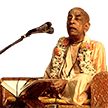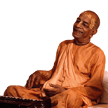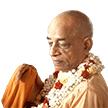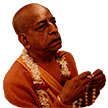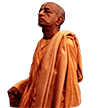Atma - an essential subject: Difference between revisions
Nayanranjani (talk | contribs) (Created page with "Category:Essential Subjects <!----------------------- edit below this line -----------------------> <!------------------------ begin introduction text below ------------...") |
(Vanibot #0041: Moves Choose Another box to the end) |
||
| Line 2: | Line 2: | ||
<!----------------------- edit below this line -----------------------> | <!----------------------- edit below this line -----------------------> | ||
<!------------------------ begin introduction text below ------------------------> | <!------------------------ begin introduction text below ------------------------> | ||
We tend to identify ourselves with the bodies that we are in, but careful study of the scriptures will enable us to understand that this material body is just a covering of our original selves. The moment this body perishes, we take up another body (this process of changing bodies is compared to changing one's clothes in the Bhagavad-gītā, which leads us to conclude that the body is just a temporary covering). In order to break free from this cycle of birth and death, we must realize that we are not this body, but are the soul within. The Sanskrit term for soul is 'atma'. Since we are parts and parcels of the Supreme Lord, we are known as jivatmas, while the Supreme Lord is known as paramatma (param meaning 'the highest' and atma meaning 'soul'). | |||
Srila Prabhupada's books, lectures, conversations and letters offer a comprehensive presentation of this essential subject as seen in the Vaniquotes '''[[Vaniquotes:Category:Atma|Atma]]''' category. An introduction from his books is given below in the following | Srila Prabhupada's books, lectures, conversations and letters offer a comprehensive presentation of this essential subject as seen in the Vaniquotes '''[[Vaniquotes:Category:Atma|Atma]]''' category. An introduction from his books is given below in the following 8 quotes. | ||
<!-------- end introduction text and don't touch next three lines ---------> | <!-------- end introduction text and don't touch next three lines ---------> | ||
---- | ---- | ||
== Quotes from Srila Prabhupada's books == | == Quotes from Srila Prabhupada's books == | ||
<!----------------- edit quote boxes below this line -----------------> | <!----------------- edit quote boxes below this line -----------------> | ||
{{VaniQuotebox| | {{VaniQuotebox|Atma-vit means a self-realized soul or bona fide spiritual master. Unless one is self-realized and knows what his relationship with the Supersoul is, he cannot be a bona fide spiritual master|Ātma-vit means a self-realized soul or bona fide spiritual master. Unless one is self-realized and knows what his relationship with the Supersoul is, he cannot be a bona fide spiritual master. Here it is recommended that one should seek out a bona fide spiritual master and surrender unto him (arcanam), for by inquiring from and worshiping him one can learn spiritual activities. '''(Śrīmad-Bhāgavatam 3.28.2)'''}} | ||
{{VaniQuotebox| | {{VaniQuotebox|Atmavan especially means that one should be self-possessed. He should always remain in the pure consciousness that he is spirit soul and not the material body or the mind. That will make him progress confidently in Krsna consciousness|Ātmā means the body or the mind, but here the word ātmavān especially means that one should be self-possessed. He should always remain in the pure consciousness that he is spirit soul and not the material body or the mind. That will make him progress confidently in Kṛṣṇa consciousness. '''(Śrīmad-Bhāgavatam 3.27.8)'''}} | ||
{{VaniQuotebox| | {{VaniQuotebox|Except for bhakti-yoga, any method for realization of atma-tattva, or the science of atma, will prove deceptive in the long run|Śrīla Śukadeva Gosvāmī says that for purification of both wrong conceptions, the Lord presented His eternal form before Brahmājī, being fully satisfied by Brahmā's nondeceptive vow of discharging bhakti-yoga. Except for bhakti-yoga, any method for realization of ātma-tattva, or the science of ātmā, will prove deceptive in the long run. '''(Śrīmad-Bhāgavatam 2.9.4)'''}} | ||
{{VaniQuotebox| | {{VaniQuotebox|The word atma denotes body, mind and soul - depending upon different circumstances|The word ātmā denotes body, mind and soul—depending upon different circumstances. In the yoga system, the mind and the conditioned soul are especially important. Since the mind is the central point of yoga practice, ātmā refers here to the mind. The purpose of the yoga system is to control the mind and to draw it away from attachment to sense objects. '''(Bhagavad-gītā 6.5)'''}} | ||
{{VaniQuotebox| | {{VaniQuotebox|Those who are not atma-tattva-vit, who do not know the spiritual value of life, can be satisfied with external material opulences, but those who are atma-tattva-vit are not inspired by material opulence|Those who are not ātma-tattva-vit, who do not know the spiritual value of life, can be satisfied with external material opulences, but those who are ātma-tattva-vit are not inspired by material opulence. This is the instruction we can derive from the life and activities of Saubhari Muni. '''(Śrīmad-Bhāgavatam 9.6.45-46)'''}} | ||
{{VaniQuotebox| | {{VaniQuotebox|When one chants the holy name of the Lord in ecstasy, not caring for outward social conventions, it is to be understood that he is atma-mati. In other words, his consciousness is turned toward the Supreme Personality of Godhead|When one chants the holy name of the Lord in ecstasy, not caring for outward social conventions, it is to be understood that he is atma-mati. In other words, his consciousness is turned toward the Supreme Personality of Godhead. '''(Śrīmad-Bhāgavatam 7.7.35)'''}} | ||
{{VaniQuotebox| | {{VaniQuotebox|When the Lord descends from that world to this world, He descends in His spiritual body of atma-maya, or internal potency, without any touch of the bahiranga-maya, or external, material energy|When the Lord descends from that world to this world, He descends in His spiritual body of ātma-māyā, or internal potency, without any touch of the bahiraṅgā-māyā, or external, material energy. The allegation that the impersonal Brahman appears in this material world by accepting a material body is quite absurd. Therefore the Lord, when He comes here, has not a material body, but a spiritual body. The impersonal brahma-jyotir is only the glaring effulgence of the body of the Lord. '''(Śrīmad-Bhāgavatam 2.7.26)'''}} | ||
{{VaniQuotebox| | {{VaniQuotebox|Without real knowledge of atma - the soul, Mayavadi philosophers must be bewildered and must continue to lament as sudras|According to the mīmāṁsā philosophers, everything is eternal, nitya, and according to the Sāṅkhya philosophers everything is mithyā, or anitya—impermanent. Nonetheless, without real knowledge of ātma—, the soul, such philosophers must be bewildered and must continue to lament as śūdras. '''(Śrīmad-Bhāgavatam 7.2.49)'''}} | ||
<!----------------- edit quote boxes above this line -----------------> | <!----------------- edit quote boxes above this line -----------------> | ||
| Line 31: | Line 31: | ||
'''Atma - [[Vaniquotes:Category:Atma|explore more within this category]]'''. | '''Atma - [[Vaniquotes:Category:Atma|explore more within this category]]'''. | ||
{{EsentialSubjectTotal}} | {{EsentialSubjectTotal}} | ||
<div style="float:left;"> | |||
{{EssentialSubjectnav}} | |||
</div> | |||
__NOTOC__ | __NOTOC__ | ||
__NOEDITSECTION__ | __NOEDITSECTION__ | ||
Latest revision as of 15:49, 22 November 2020
We tend to identify ourselves with the bodies that we are in, but careful study of the scriptures will enable us to understand that this material body is just a covering of our original selves. The moment this body perishes, we take up another body (this process of changing bodies is compared to changing one's clothes in the Bhagavad-gītā, which leads us to conclude that the body is just a temporary covering). In order to break free from this cycle of birth and death, we must realize that we are not this body, but are the soul within. The Sanskrit term for soul is 'atma'. Since we are parts and parcels of the Supreme Lord, we are known as jivatmas, while the Supreme Lord is known as paramatma (param meaning 'the highest' and atma meaning 'soul').
Srila Prabhupada's books, lectures, conversations and letters offer a comprehensive presentation of this essential subject as seen in the Vaniquotes Atma category. An introduction from his books is given below in the following 8 quotes.
Quotes from Srila Prabhupada's books
Atma - explore more within this category.
Vanipedia has now over 903 introductory articles compiled from Srila Prabhupada's books under the series titled Essential Subjects. All these articles can be seen in the Table of Content on the right side of this article and also here in this Umbrella Category. Browse through them to relish the breadth and depth of Srila Prabhupada's teachings - There is a subject for everyone.
